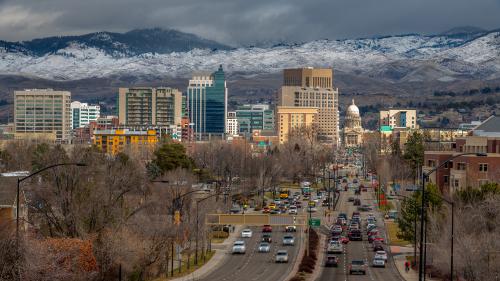Although workers’ efforts to form a union at the Amazon warehouse in Bessemer, Alabama ultimately failed, the David versus Goliath attempt “is a reflection of how broken our labor laws are.” Molly Kinder looks at growing public support for unions and says it’s critical for policymakers to act to make it easier for workers to organize for their rights.
Related material:
- Amazon’s union battle in Bessemer, Alabama is about dignity, racial justice, and the future of the American worker
- A policy manifesto for paying, protecting, and empowering essential workers
Listen to Brookings podcasts here, on Apple or on Google podcasts, send email feedback to [email protected], and follow us at @policypodcasts on Twitter.
Thanks to audio producers Gaston Reboredo and David Greenburg, Chris McKenna, Fred Dews, Marie Wilken, and Camilo Ramirez for their support.
TRANSCRIPT
PITA: Votes are being tallied in Bessemer, Alabama, following a long drive to unionize the workers at an Amazon warehouse facility there. With us to discuss the significance of this union drive and what may come next for the labor movement in America is Molly Kinder, a David M. Rubenstein fellow in the Metropolitan Policy Program here at Brookings. Molly, thanks so much for talking to us today.
KINDER: Thanks so much for having me.
PITA: As of the time that we’re recording this, Friday morning, as I mentioned, votes are still being tallied. It currently looks like the union drive might wind up failing; the no votes are currently ahead by a fairly significant margin. But whether the union comes out winning or not, this union drive has caught a lot of attention for two particular aspects: One is that it’s an Amazon facility and the other is that it’s in the south, in a “right-to-work” state. Maybe you can start us off by explaining why this particular union drive is being seen as so significant, regardless of whether the union comes out ahead or not.
KINDER: Right, this union drive has really captivated the attention of the country, and I think it’s for two big reasons. One is it’s in some ways surprising, and second, because if the union is successful and workers do vote to unionize – which does not look like it will happen – that result would be historic and would really be very significant for the labor movement.
And when I say surprising, I think it’s because Amazon is one of the most powerful companies in the world, let alone in America. Right now, it’s the second largest private employer, but with its just phenomenal growth, it could actually take over Walmart at some point with having the most number of workers in the country. It’s powerful, it’s wealthy and it’s not unionized like most other large big retail and e-commerce companies.
And it’s somewhat surprising that this this one warehouse in in Alabama with just a few thousand workers is attempting to unionize. It would be the first Amazon warehouse to be unionized and it’s somewhat surprising that it’s happening in the south, in in a “right-to-work” state, which is not a place we normally associate with successful union drives. Already the rules are sort of stacked up against workers who try to organize and form a union, but especially so in a “right-to-work” state like Alabama, so I think the feeling is almost like David versus Goliath in a way, that this one small warehouse with a few thousand workers is taking on one of the most powerful companies in the country.
I think the other element that’s really timely and of the moment is that the vast majority of those workers in Bessemer at that warehouse are Black. And we’re not even a year after George Floyd’s murder. There’s been so much more awareness of Black Lives Matter and racial equity, so I think that element, this almost civil rights and racial justice element of it, adds to this broader conversation about labor rights and worker power.
PITA: Amazon has made very much of the fact, in their social media campaigns and their campaigns to the workers, of the fact that this facility does pay $15 an hour or more, which is certainly a lot higher than Alabama’s standard minimum wage, so besides pay equity what are some of the other major factors behind the union drive here?
KINDER: So, I think what has really struck a nerve with this particular union drive is that the predominant ask is actually not pay. And I think when the public thinks about unions, we often think about bargaining over pay and, of course in our country’s economic history unions have been core to the growth of the middle class and the ability of workers to secure higher wages and better benefits, but that’s actually not the dominant narrative for this particular campaign within Amazon. Amazon has a starting wage of $15 an hour. That’s actually not especially high for the warehouse industry, it’s actually a little bit below average for a typical warehouse job. But overall that’s actually considered, it’s almost double the minimum wage and in Alabama that’s a pretty significant wage.
Some of the workers have expressed a desire for hazard pay and that’s something that my colleague Laura Stateler and I’ve written a lot about. Amazon has seen just an incredible profit growth during the pandemic and actually has not been especially generous to workers in hazard pay. Our research shows that the bonuses they’ve given translate to about $1 extra an hour, whereas competitors like Costco are still giving $2 an hour extra. So, Amazon certainly has the profits to pay their workers extra.
But really what we’re hearing from workers who are stepping up to organize is this is really much more about working conditions. It’s about feeling like they want some say in the way that their workplace is organized, what is being expected of them. It’s a lot about dignity, about the ability of workers to just take a break and go to the bathroom. Some other workers who’ve been interviewed have expressed they feel like robots; they don’t feel human; that they’re being overworked; they don’t have a voice; they’re being surveilled. So I think this drive is really not actually at the end of the day as much about tangible benefits like pay; it comes down to more workers feeling like they want a voice in the way that their work is organized, what is being asked of them, their safety, and their work conditions.
PITA: On that line, the COVID-19 pandemic has really exposed both how much of our daily lives depends on essential workers – how many workers in our economy are in fact essential – and also how many of those workers are earning minimum wage and or are working under really poor conditions. Do you see this union drive as a potential sign of a broader resurgence in public support and or worker interest in unionizing?
KINDER: Absolutely, I think it’s not an accident that this drive is happening a year into the COVID-19 pandemic where Amazon workers are amongst those who are the essential workers on the front line. And Amazon workers are those who’ve lost their lives, because of the risk they face at work. There’s been some recent polling that shows that public support in America for unions is at a multiple decades-long high of 65%. And I think that’s a lot to do with this recognition that work changed during the pandemic. I’ve interviewed dozens of frontline essential workers from meatpacking plants to grocery stores to nursing homes and hospitals. Any of these jobs that workers – 50 million frontline essential workers – have been asked to go to during the pandemic are suddenly very risky in ways that they didn’t sign up for necessarily. You know, the feeling that I heard in a lot of these interviews was, just going to work could mean that I could be risking the life of the loved ones that I live with at home. And the decisions of employers and managers as directly impacting what I care about most which is, which is my family and their health, and so I think this feeling that going to work, you’re turning over your safety and what you cherish to an employer has just raised consciousness of how important it is that workers have safety at work, that they are able to shape their working conditions. And that, when things aren’t going well, that they can express themselves, they can speak up and they can demand better conditions.
And what’s really striking is that there’s a lot of evidence to show that unionized workplaces are actually safer workplaces, including in the pandemic. There’s some new academic literature that shows that unionized nursing homes had lower COVID mortality and that’s mainly because workers were able to speak up and demand better access to protective equipment. This is an issue that came up a lot in my interviews with workers that those were unionized, sometimes they were denied proper PPE, but they had some recourse, they could they could speak up and challenge that and try to seek better safety. So I think that this this this conversation about workers and unionizing and wanting more power and voice is very much part and parcel of the moment we’re in with the pandemic and the great risks that especially lower-age essential workers have faced.
PITA: I’m glad you mentioned safety; that’s such an important angle that I think in America we don’t think a lot about anymore, like it’s been a long time since Upton Sinclair’s “The Jungle.” So that’s, I’m really glad you brought that up.
We’ve seen from policymakers, President Biden, famously from working class Scranton, Pennsylvania, unsurprisingly, he has come out strongly in support of the union. However, we’re even seeing some rare Republican support from people like Florida Senator Marco Rubio. What’s the role for Congress or other policymakers in supporting workers or in just continuing the future of the labor movement here in America?
KINDER: I think it’s critical that policymakers act. What we’re seeing happening in Bessemer is fascinating in part because it’s Amazon and we’re interested in it, because of this power dynamic and, sort of, our imagination is captured by the bravery of these workers who stood up to one of the most powerful companies. But what we’re seeing play out in that warehouse and how difficult it is for those workers to achieve what they want to achieve is a reflection of how broken our labor laws are and how much those labor laws are really stacked against workers who are trying to organize.
So, for instance, we’ve seen in Bessemer it’s perfectly legal what Amazon has done in terms of requiring those employees to sit through anti-union trainings, that they when they go to the bathroom even there’s anti-union propaganda, that they’ve hired anti-union consultants, that they’re making it difficult for union organizers to access workers on the job. Some of the tactics that they’ve apparently deployed may not be legal including encouraging the Post Office to put a postal box right in the in the parking lot. But a lot of what they’re doing is perfectly legal and really it leaves a very uneven playing field so it’s actually not surprising if the union organizing fails because really those workers, even if they wanted to unionize, they really face a lot of obstacles to do so.
So really the only way to make it possible for workers to organize is if we if we amend our labor laws. So really, it’s historic that President Biden has stood up so much, that he recorded a message on behalf of those workers, saying that they absolutely should have the right to organize, their employer should not interfere, and that is historic. I think a lot of champions of workers and unions have applauded that move, but ultimately unless laws are reformed it’s going to continue to be an uphill battle.
So, there’s a lot of focus on Congress. There’s the PRO Act that’s been proposed and has a lot of Democratic support, but really has almost no Republican support. So, I think that’s – the political obstacles are many, but I think it’s important to keep in mind that gap between public support for unions and the percent of workers who are in a union. So, 65% of Americans support it, but only 10% of American workers are member of union. That is just an extraordinary gap and unless the labor laws are reformed to make it easier for workers to organize, we are not going to see much success.
PITA: Alright, well, we will wait and see what happens. Molly, thanks so much for talking to us today and explaining this.
KINDER: Great, thanks for having me. I really appreciate it.





Commentary
PodcastWhat does the Amazon union effort signify for labor in America?
April 9, 2021